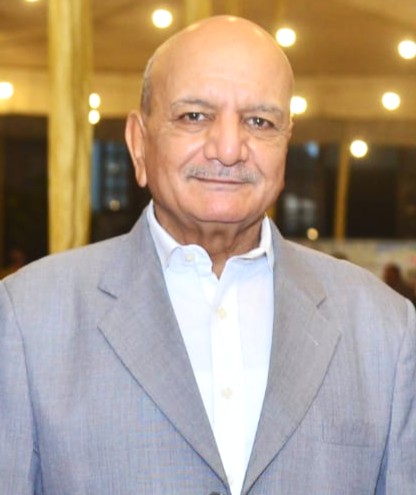
By Zahid Hussain Karani
In Turkmenistan’s theatre of power, few spectacles match the choreography of its energy politics. And in Herat, under the watchful desert sun, the script unfolded once more. Gurbanguly Berdimuhamedov — exalted as Hero-Arkadag, the “protector” and still the defining figure of Turkmen political life — presided over the latest chapter of the Turkmenistan–Afghanistan–Pakistan–India (TAPI) gas pipeline project.
What could have been a routine technical milestone was transformed into a national ritual. The ceremony at Rabat Sanghi in western Afghanistan resembled less an infrastructure launch and more a state-sanctioned affirmation of Arkadag’s enduring place at the centre of Turkmenistan’s identity. Officials from both Turkmenistan and Afghanistan gathered in solemn symmetry, prayers were offered, and the pipeline was christened Arkadagyň ak ýoly — “The White Road of Arkadag.”
This vast pipeline, conceived to carry Turkmen gas through Afghanistan and into South Asia, remains one of the most ambitious and geopolitically delicate ventures in the region. Its completion, if achieved, promises not only new energy flows but also a rare axis of cooperation linking some of the world’s most complex neighbours. Yet, at this stage, what moves more smoothly than the machinery is the political narrative.
The event’s choreography was precise. Turkmen officials paid deference to both President Serdar Berdimuhamedov and his father, the National Leader, whose dual presence embodies the dynastic balance of the state. Arkadag received a commemorative uniform from the state gas company — a symbolic offering, part loyalty, part homage. Each gesture was meticulously staged to reinforce continuity: father and son, past and present, bound in a shared vision of Turkmen exceptionalism.
When Berdimuhamedov addressed the assembly, his words carried the tone of both statesman and patriarch. The TAPI pipeline, he said, was more than an engineering enterprise; it was a “symbol of friendship” among nations. Turkmenistan, with its vast hydrocarbon reserves, seeks to transform natural abundance into regional peace — a familiar refrain in Ashgabat’s official rhetoric. Energy, in this narrative, is not merely export; it is diplomacy, it is destiny.
From the Afghan side, the optics were equally deliberate. Abdul Ghani Baradar, Afghanistan’s Deputy Prime Minister for Economic Affairs, offered gratitude to both Arkadag and President Serdar, relaying greetings from the Taliban’s Prime Minister, Mullah Mohammad Hassan Akhund. The message was clear: Afghanistan, long seen as the project’s weakest link, remains publicly committed to facilitating the pipeline’s passage. A short documentary — rich in praise and filtered optimism — showcased progress on the Serhetabat–Herat section, reinforcing the idea that TAPI is more than talk.
In an unexpected flourish, Arkadag extended acknowledgment to the United States — rare praise in Turkmen officialdom — citing its early encouragement of the TAPI project and the ongoing consultancy role of the American firm Brownstein. It was a subtle admission that even in a system built on self-reliance and control, Western expertise remains a valued, if carefully framed, partner.
After the formalities, the performance shifted from words to visuals. Cameras tracked Berdimuhamedov as he toured the machinery, observed welding demonstrations, and, with theatrical gravitas, gave his personal blessing to the next construction phase. The gesture transformed a simple procedural moment into a scene of national consecration — an act designed to fuse faith, leadership, and progress into one seamless image.
To outside observers, Turkmenistan’s energy narrative has always been part ambition, part mythology. The TAPI pipeline — first proposed in the 1990s and repeatedly delayed by politics and security — sits at the heart of this story. For the leadership in Ashgabat, it represents more than economic outreach; it is a promise that Turkmen gas can unite divided regions and bring prosperity across borders. Yet the realities of implementation — from Afghanistan’s instability to regional rivalries and fluctuating global demand — remain stubbornly unresolved.
Still, symbolism matters deeply in Turkmen statecraft. The blessing of Arkadagyň ak ýoly served multiple purposes: it reaffirmed the father’s legacy under the son’s rule, projected an image of unwavering continuity, and signalled to the world that Turkmenistan’s grand energy vision remains alive, if not yet fully realised.
Behind the grandeur lies a subtler truth. The pipeline’s success will depend not on ceremony but on the practical reconciliation of politics, security, and financing — elements that rarely align easily in Central and South Asia. Yet for now, Turkmenistan’s leadership appears content to keep the story alive, using ritual as reassurance, pageantry as progress.
For the Turkmen elite, these ceremonies are not mere celebrations of infrastructure; they are acts of political liturgy. In them, the state renews its faith in itself. The son inherits the father’s myth, and the myth sustains the state’s image of eternal movement toward modernity. Whether the gas will one day flow freely to Pakistan and India remains uncertain. But the narrative — polished, choreographed, and blessed — flows perfectly.
(The writer is a diplomatic correspondent and a senior journalist, can be reached at news@metro-mroning.com)


